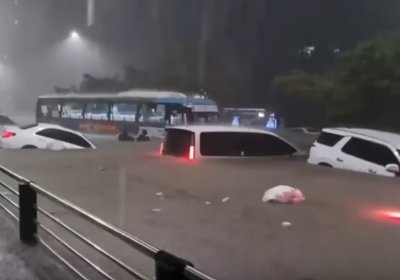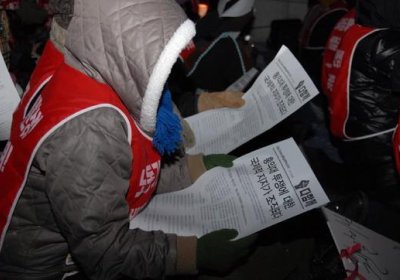Peter Boyle spoke to SooYoung Hwang from the Korean Peace Appeal about the campaign to end the Korean War.
Seoul
A new climate justice movement is growing in South Korea, with the help of the trade union movement, reports Alice S Kim.
North Korean leader Kim Jong-un and United States President Donald Trump met at a historic summit in Singapore on June 12 that concluded with a joint statement. Those who want peace and denuclearisation on the Korean Peninsula have welcomed the success of the summit. Though the end of the war has not been declared, a decisive step towards complete denuclearisation and an end to mutual hostilities has been taken.
The intra-Korea summit on April 27 may well be recorded as historic, writes Youngsu Won from Seoul, but questions remain about how stable any peace that emerges will be.
The Panmunjeom Declaration signed by Kim Jong-un and Moon Jae-in clearly signifies Korea’s transition to peaceful coexistence. This development is welcomed by all except for anti-communist hysterical lunatics, nationally and internationally.
Last October, the hashtag #MeToo went viral around the world as women shared their experiences of sexual harassment and assault.
When South Korean prosecutor Seo Ji-hyun made a historic televised revelation in January of sexual harassment she had suffered in 2010 by a senior prosecutor, it stirred the rapidly spreading #MeToo movement across South Korea.
This winter has been extremely cold in South Korea, with temperatures regularly reaching well below -10°C — perhaps another sign of climate change.
Will a verbal war between a senile dotard and a little rocket man result in an actual war? Probably not, but at the moment, the risk is unprecedented.
The reason it remains unlikely is simply because the consequences of any actions are so catastrophic. Right now, this is the only deterrent to war.
At 11.22am on March 10, Chief Justice of the Constitutional Court Lee Jeingmi announced the court had unanimously decided to dismiss President Park Geun-hye. With that, after a 92-day trial, Park’s presidency was over.
South Korea is currently in a vortex of an unprecedented political crisis.
President Park Geun-hye is under huge pressure to resign after a series of exposures of her shameful scandals related to Choi Soonshil, her friend of 40 years and daughter of Reverend Choi Tae-min who allegedly dominated a young Park after the 1975 assassination of her mother.








